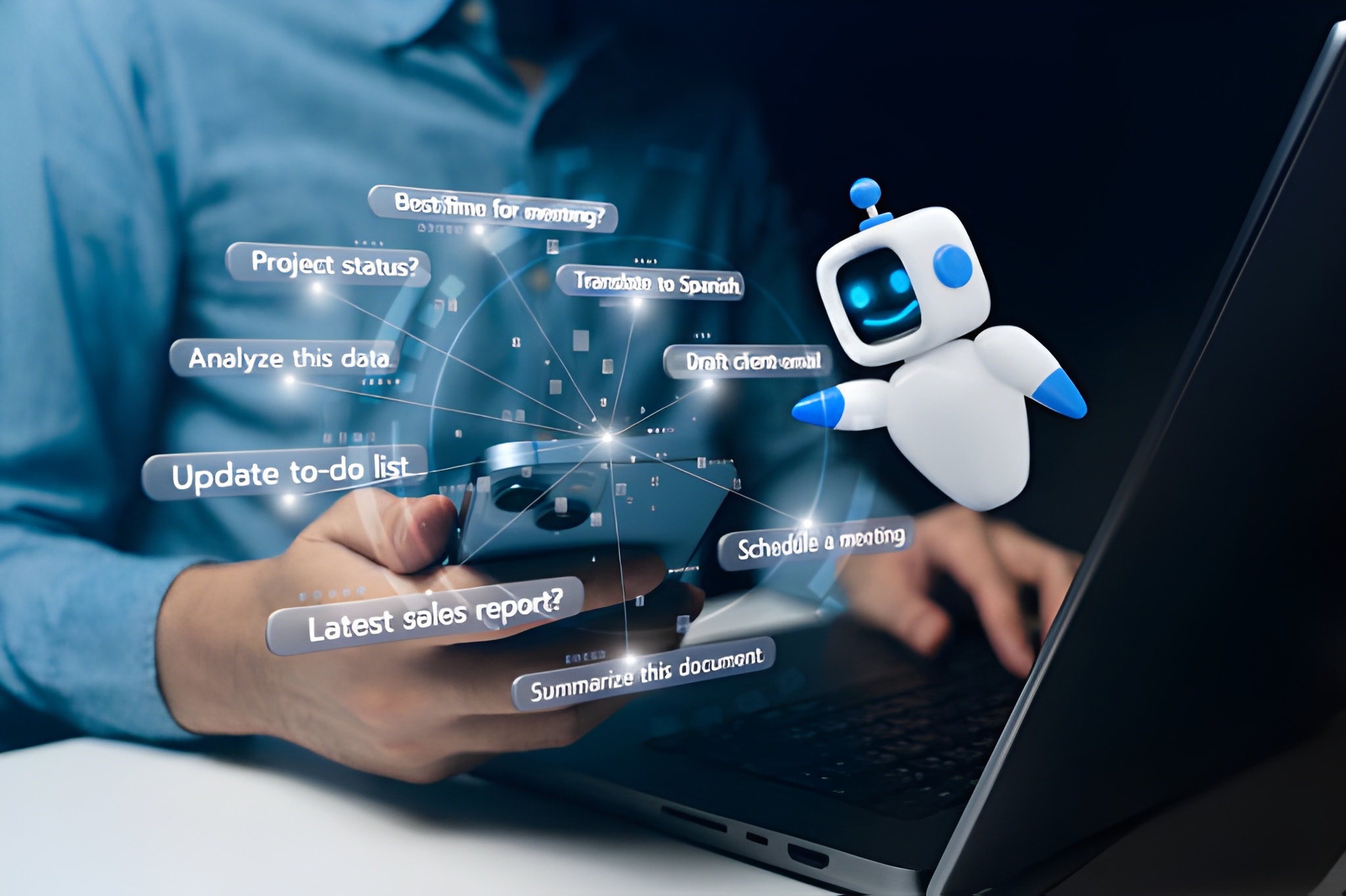TL;DR
This guide explores how AI virtual assistants have evolved from simple schedulers into powerful tools that drive significant efficiency gains. The article breaks down virtual assistants’ core benefits, such as reclaiming valuable time for strategic tasks and reducing operational costs. It also highlights how AI workflow automation can streamline complex processes, from managing customer inquiries to organizing data, minimizing errors, and accelerating operations.
As a business leader, your most valuable asset is time. Yet, the day is often filled with administrative tasks, email management, and scheduling that pull you away from strategic work. What if you could delegate these tasks to a tireless, efficient team member who works 24/7? This is the promise of the modern AI virtual assistant, a tool revolutionizing AI virtual assistant productivity for businesses worldwide.
What is an AI Virtual Assistant?
A true AI Virtual Assistant is a sophisticated software agent powered by artificial intelligence, machine learning, and natural language processing. It can understand complex requests, learn your preferences, and execute multi-step tasks across different applications.
Unlike a human assistant, it can process thousands of emails in seconds or schedule dozens of meetings without conflict. It acts as an intelligent hub, connecting your various software tools to create a seamless and automated workflow. This focus on ai virtual assistant productivity is what sets it apart from basic automation tools.
The Core Virtual Assistant Benefits for Your Business
Integrating an AI assistant is a strategic move that delivers a powerful return on investment by transforming how your team works.
Reclaim Hundreds of Hours of High-Value Time
One of the most significant virtual assistant benefits is that you save a lot of time. Repetitive tasks like scheduling meetings, filtering emails, transcribing notes, and generating standard reports consume a huge portion of the workday. An AI assistant can handle all of these, freeing up your team to focus on high-impact activities like strategy, customer relationships, and innovation.
Drastically Reduce Operational Costs
An AI assistant can perform the work of multiple administrative roles at a fraction of the cost. You eliminate expenses related to salaries, benefits, and office space. Furthermore, by reducing the chance of human error in tasks like data entry or scheduling, you save money on fixing costly mistakes. This makes it a highly efficient tool for optimizing your budget while increasing output.
Enhance Customer Responsiveness
Customers expect fast responses. An AI assistant can be the first point of contact, providing instant answers to common questions, scheduling support calls, or routing inquiries to the right person 24/7. This ensures that no customer is left waiting, which significantly improves satisfaction and loyalty a key aspect of the virtual assistant benefits.
How AI Workflow Automation Drives Efficiency
The true power of these tools lies in their ability to manage entire workflows, not just single tasks. AI workflow automation connects a series of actions across different platforms to achieve a business outcome.
For example, when a new lead comes in through your website, an AI assistant can:
- Automatically create a new record in your CRM.
- Send a personalized welcome email to the lead.
- Analyze the lead’s information to qualify them.
- Schedule a discovery call on a sales representative’s calendar.
This entire sequence happens instantly and without any human intervention, significatly accelerating your sales cycle. This level of AI workflow automation is a game-changer for businesses.
Our AI Virtual Assistants in Action: Case Studies
Case Study 1: Streamlining a Consulting Firm’s Operations
- The Challenge: A management consulting firm was losing countless hours to administrative chaos. Consultants were double-booked, client reports were delayed, and follow-ups were missed.
- Our Solution: As their chosen AI Automation Agency, we deployed a central AI assistant integrated with their calendars, email, and project management software. The assistant managed all scheduling, sent automated reminders, and compiled data for weekly progress reports.
- The Result: The firm reclaimed over 30 hours of administrative work per consultant each month. This directly translated to higher billable hours and improved client satisfaction, showcasing a clear boost in ai virtual assistant productivity.
Case Study 2: Managing Inbound Leads for a Real Estate Agency
- The Challenge: A busy real estate agency was overwhelmed by the volume of online inquiries. Agents couldn’t respond fast enough and valuable leads were slipping through the cracks.
- Our Solution: We implemented an AI assistant that managed their primary inquiry email address. It could understand the content of each email, identify the property of interest, answer basic questions, and schedule a viewing with the appropriate agent based on their availability.
- The Result: The agency achieved a 100% response rate to all new inquiries within 60 seconds. Lead capture increased by 45%, and agents could focus their time on showing properties and closing deals.
Our Technology Stack for Intelligent Assistants
We use a modern, powerful stack to build AI assistants that are smart, reliable, and secure.
- Natural Language Processing (NLP): OpenAI, Google Dialogflow, Rasa
- Integration Platforms (iPaaS): Zapier, Workato, MuleSoft
- AI & Machine Learning: TensorFlow, PyTorch, Scikit-learn
- Cloud Infrastructure: AWS, Google Cloud AI, Microsoft Azure AI
Conclusion
The strategic implementation of an AI virtual assistant is one of the most effective ways to boost productivity in 2025. The benefits of leveraging virtual assistant are clear, moving far beyond simple task management to enable sophisticated AI workflow automation. By choosing to Automate Business Processes, we can empower our team to operate at its highest potential. At Wildnet Edge, our AI-first approach ensures we build more than just an assistant; we create an intelligent partner that learns and adapts to your business, delivering a compounding return on your investment in ai virtual assistant productivity.
FAQs
Yes. Modern AI assistants are designed for integration. They use APIs to connect seamlessly with your existing CRM, email, calendar, project management tools, and other business software to create a unified workflow.
Enterprise-grade AI assistants are built with robust security protocols, including end-to-end data encryption and strict access controls, to ensure your sensitive company information remains protected at all times.
A powerful AI assistant can be trained on your specific business rules, communication style, and unique workflows. The system learns and improves over time, becoming more efficient as it handles more tasks.
A chatbot typically follows a rigid, script-based logic to answer simple questions. An AI virtual assistant uses artificial intelligence to understand intent, manage complex, multi-step tasks, and make decisions based on the data it analyzes.
The ROI is typically seen within months and comes from three main areas: direct cost savings on administrative salaries, increased revenue from faster lead follow-up and sales cycles, and the value of reclaimed time for high-level strategic work.
Yes, to a greater extent. It’s more about augmentation than replacement. The AI assistant handles the high-volume, repetitive tasks, elevating the role of human staff. They can then focus on more complex, creative, and relationship-oriented responsibilities that require a human touch.
The first step is a workflow assessment. Identify your organization’s most time-consuming and repetitive processes. Then, design a custom AI automation strategy that targets these areas for the fastest and most impactful results.

Managing Director (MD) Nitin Agarwal is a veteran in custom software development. He is fascinated by how software can turn ideas into real-world solutions. With extensive experience designing scalable and efficient systems, he focuses on creating software that delivers tangible results. Nitin enjoys exploring emerging technologies, taking on challenging projects, and mentoring teams to bring ideas to life. He believes that good software is not just about code; it’s about understanding problems and creating value for users. For him, great software combines thoughtful design, clever engineering, and a clear understanding of the problems it’s meant to solve.
 sales@wildnetedge.com
sales@wildnetedge.com +1 (212) 901 8616
+1 (212) 901 8616 +1 (437) 225-7733
+1 (437) 225-7733
















 AI Development Services
AI Development Services Industry AI Solutions
Industry AI Solutions AI Consulting & Research
AI Consulting & Research Automation & Intelligence
Automation & Intelligence













